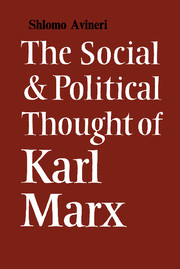Book contents
- Frontmatter
- Contents
- Preface
- TO THE MEMORY OF MY FATHER
- Introduction
- 1 Hegel's political philosophy reconsidered
- 2 The proletariat: the universal class
- 3 Homo faber
- 4 Alienation and property
- 5 Praxis and revolution
- 6 The revolutionary dialectics of capitalist society
- 7 The French Revolution and the terror: the achievements and limits of political revolution
- 8 The new society
- Epilogue: the eschatology of the present
- Bibliography
- Index
2 - The proletariat: the universal class
Published online by Cambridge University Press: 05 June 2012
- Frontmatter
- Contents
- Preface
- TO THE MEMORY OF MY FATHER
- Introduction
- 1 Hegel's political philosophy reconsidered
- 2 The proletariat: the universal class
- 3 Homo faber
- 4 Alienation and property
- 5 Praxis and revolution
- 6 The revolutionary dialectics of capitalist society
- 7 The French Revolution and the terror: the achievements and limits of political revolution
- 8 The new society
- Epilogue: the eschatology of the present
- Bibliography
- Index
Summary
Despite its chaotic arrangement, Marx's Critique of Hege's Philosophy of Right is the most systematic of his writings on political theory. Marx had always hoped to return to the subject, as can be seen from his opening sentence to the Preface to A Contribution to the Critique of Political Economy (1859). There he says that Part iv of his comprehensive study will be devoted to a discussion of the modern state: ‘I examine the system of bourgeois economics in the following order: capital, landed property, wage labour; state, foreign trade, world market.’ But Marx never reached Part iv because of the disproportionate growth of what he originally intended to be merely Part 1, Das Kapital.
Nevertheless, some of Marx's later remarks about the political structure re-state the conclusions he had drawn in 1843 from his early confrontation with Hegel's political theory. This relationship is particularly evident in his treatment of the dialectical relations between economics and politics. In his later writings, as in his Critique, the political never appears as a mere mechanistic or automatic reflection of the economic.
Several instances reveal the dynamic relation of the two spheres, though Marx's failure to treat this subject systematically in his later writings has caused readers to overlook its appearances. In 1862 Marx tells Kugelmann that, though the first chapter of his Capital contains ‘the quintessence’ of all the following chapters, the relationships of ‘different state forms to different economic structures of society’ could not be deduced from this chapter with ease.
- Type
- Chapter
- Information
- The Social and Political Thought of Karl Marx , pp. 41 - 64Publisher: Cambridge University PressPrint publication year: 1968
- 1
- Cited by



